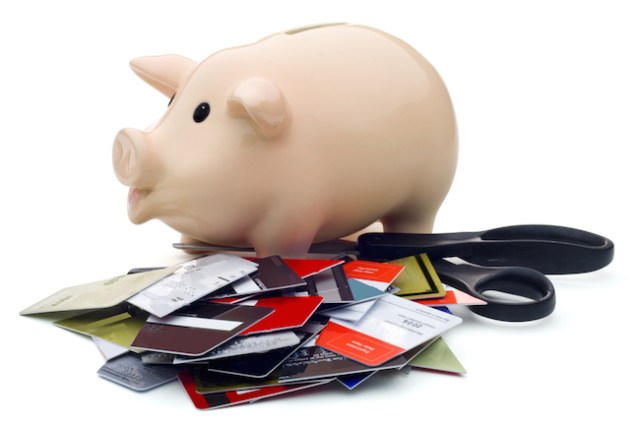Often, when I’m watching a reality show or game show and they announce the grand prize, I find myself thinking (or saying aloud to my spouse), “Oh, wow. $10,000. That would pay off… some of our credit card debt… yay.” or “Daaaamn. $100,000! Babe, we would be able to pay off our credit cards and almost all our school loans with that!” Hashtag Real Life.
Here’s the thing about making not-great financial decisions: it happens. It happens to a lot of people. Sometimes you just make an impulsive decision. Sometimes you make a series of small impulsive decisions that rapidly spin out of control. Sometimes you have very little choice because something happens — a medical expense, a family emergency, unexpected unemployment. The reason isn’t important and we’re not here to point fingers. We’re here to talk about how to get out of debt or, if that feels too big right now, how to manage your existing credit card debt in such a way that it doesn’t keep you awake at night. Because neither you nor I are going to win the lottery tomorrow.
I’m not going to pretend this will be easy because it probably won’t be. And if you live close to your means, it is going to be pretty darn hard. I hate financial advice that is like, “Ride a bike and don’t eat fast food and it’s so easy! You’ll retire at 35!” Because many of those finance bloggers were bringing in six figure salaries before they “retired” or took frugality to such an extreme that it is near impossible for anyone to have the discipline for (especially if you work multiple jobs or are underemployed). So I’m going to suggest practical ways to deal with debt, not fairy tale scenarios. Because I believe you can do it. Let’s make a plan!
Where to Start

Stop Using Your Cards
Stop right now. Put them down. It has gone too far. Yes, you should try to use your credit cards occasionally to keep them active, but when the balance has ballooned out of control, you are better off not using them at all. Don’t close your cards. Closing your cards with a balance on them is not good for your credit score. I wouldn’t suggest closing your cards at all, actually, even the ones you have paid off. Just stop using them.
When I was curbing my credit card problem, I stopped carrying my cards in my wallet. I put them in a safe place where I couldn’t access them unless I was planning ahead of time to purchase something with them. You can also cut up your cards so they will no longer swipe. Or freeze your cards in a block of ice in a tupperware container. The goal is to take the credit card out of your pocket so you are forced to live within your means. If you run out of cash money before payday and you really want that new Lumberjanes issue, you’re going to have to just deal. But if you have a real emergency, you can get to the cards with a little effort.
Make a Budget
Now that you aren’t relying on your cards, you’re going to have to make a budget. Write down all your monthly expenses, including rent/mortgage, utilities, subscriptions, memberships, phone bills, student loan payments, credit card payments, other bills, groceries, gas and car maintenance, etc. Now look at how much income you have coming in each month. Look at the bills and expenses that you have to pay in order to live (rent, utilities, groceries, etc) first and make sure you have enough to cover the essential expenses. Now, look at the bills that you have to pay (student loans, credit cards, car loans, etc) and make sure you have enough to cover these bills. Now, look at the other things (cable bill, gym membership, magazine subscriptions, etc). How much do you have left?
If you still have money in your monthly income line after all that, you’re in great shape. This is good! Very good! You may be wondering how it is that you never have money if you have all this extra money in your budget. Chances are you spend it on little things that add up: a coffee here, a new shirt there, a dinner out, a few drinks with friends. It will be easier to see where you can cut if you write down what you spend in a checkbook or us an app that tracks your spending in different categories, so you can see exactly where your money is going. After researching where your money is going, decide on a reasonable budget for that kind of fun and optional stuff and commit to not going over budget. Some people take their “fun stuff” budget out in cash so they can only spend what they have in cash. Or use a budget and finance tracking app. When the money is gone, it’s gone! The rest is going to go to paying off your debt and it’ll be worth it in the long run!
If you find that you don’t have much money left after you pay all your bills, you should try to find some areas where you can cut back. What if you got Netflix or Hulu instead of cable? What if you worked out at home instead of the gym? What if you carpooled or took public transportation instead of driving? Made coffee at home instead of stopping at a cafe? See how much you can cut back on your expenses to create a little bit of discretionary cushion in your budget that can be put to debt payoff.
You may find that you don’t have enough money, even when you cut back to the bare essentials. If this is the case, you may need to make drastic changes to your life — find a cheaper place to live, negotiate with your lenders on payment plans, sell off some assets (like your car or other personal possessions) or make the drastic-but-sometimes-necessary decision to file for bankruptcy. I really hope this isn’t your situation, though if it is, you aren’t alone. Credit card debt is often the thing that pushes people into filing for bankruptcy. But this should be a last resort. See if any of these tips can help you get back on track before you make that decision.
Organize Your Credit Cards by APR and Balance
Look at all your credit card bills. Create a chart of them, including your APR on each card, total line of credit, and your current balance. You can do this yourself or use an app like Mint that pulls the info from your linked accounts. If you want to use it, I made y’all a copy of the very spreadsheet I use that you can download in Excel. It’s populated with fake numbers so you can visualize how to fill it out.
Now you should have the full picture in front of you: your expenses, your income, your budget, your credit card debts.
Debt Reduction Methods

Plan for Accelerated Payments
You always want to pay more than the minimum payment on your cards, if you can. Pay as much as you can. Often, the minimum payment amount just barely covers the interest you were charged… and it will take years and years and years to pay off if you only make the minimum payment. The more you pay over the minimum, the more your principal balance goes down and the less interest you pay overall and the faster you get out of debt.
If you have more than one active card, you may want to be strategic about how you accelerate payments versus just throwing money at all your credit card bills. There are (at least) two methods to doing this and now that you have all your credit card info mapped out, you can pick according to what will work best for you.
Pay Lowest Balances First – the Snowball Method
It can be really motivating to pay off a card. And sometimes it makes sense to just pay off the cards with the lowest balances first. Why? Because it feels awesome to completely pay off a card. Also, once you have paid off a card, you can add the amount you were putting into paying off that card onto what you’re paying on the next card on your list. So let’s say you have two cards. Card One has a $25/month minimum payment and Card Two has a $100 minimum payment. You have to make both those payments each month. You have a $250 budget to put towards debt (on top of your minimum payments). Card One has the smallest balance, so you decide to pay that one first. You throw the extra $250 towards Card One each month on top of the minimum payment. Soon, you pay off Card One. Now you take the $275 ($250 debt payoff budget plus the $25 minimum you were paying already on Card One) and apply it to Card Two. Now you focus all your attention on Card Two, paying a total of $375/month ($275 plus the $100 minimum you were already paying on Card Two) until it is paid off. And when you pay off Card Two, you roll the $375 into your next debt payment goal. As you knock out debts, the amount you can put to your total debt keeps growing and growing until you are out of debt! This method lets you celebrate more victories along the way because you pay off your smallest debts first.
Pay Highest APR First – the Avalanche Method
If you want to pay the lowest amount of money overall, start by paying off the card with the highest APR first. Why? Because you will pay off less interest overall. You can use the same method for knocking out debt as above, but focus first on the card with the highest APR. When you have paid off that card, roll the amount you were paying into your payment for the next highest APR card. And so one and so forth.
You may choose to use a combination of these methods, depending on what works best for you. If you have two or more cards with significantly high balances, I’d suggest starting with the one with the higher APR. If you also have a card or two with a very low balance, it might make sense to knock those out regardless of APR rate before you start addressing the high balance cards—just so you have fewer bills to pay and more money to work with.
Ask for a Lower APR Rate
If you have been making on-time payments for a while and have decent credit history, you can call the bank issuing your card and ask for a lower APR. Or a promotional APR. It doesn’t hurt to ask!
Request a Balance Transfer
Transferring your high APR balances to a card with a lower APR might be a good idea. It is not a solution to your debt issues, overall, and should be approached with caution. If you have a card that is paid off (has a $0 balance), see if they have any balance transfer promos by logging into your account online or calling customer service. You can also open a new card, which often come with 0% APR balance transfer promotions. But just be careful. Doing this over and over is not a good idea. This should be a short-term fix to help you consolidate debt or get out of a high APR while you really target your debt payment plan. At the end of the balance transfer promo, a standard APR will come into effect. You want to be able to pay off your debt before the standard APR goes into effect. If you can’t, you may want to think carefully about how often you are willing to transfer your balances between cards. Even with a 0% APR promotion, you will typically have to pay a balance transfer fee each time you transfer of 3-5%. Balance transfers can be a good tool to save money, but shouldn’t be used as a crutch for avoiding getting out of debt permanently.
Apply for a Consolidation Loan
Like balance transfers, a consolidation loan can help you save money and streamline your life by putting all your credit card debt into one big pile. A consolidation loan issuer will take on your current debts at one APR rate under one loan. This is great to simplify your bills into one payment. It’s not always the best move, though, and may end up costing you more money if you aren’t careful. Also, be hypervigilant about credit counseling scams that might try to sell you a consolidation loan that might not be in your best interest. As student loan debt balloons, more and more debt consolidation scams are popping up targeting folks who are overwhelmed by debt.
Find More Money
This is easier said than done, I know. It’s super effective if you can make it happen. You can make extra money by taking on side jobs in addition to your primary job, like moving lawns or running errands or babysitting or freelancing. Or find an hourly part-time job that works with your schedule like bartending or retail or working for a catering company on the weekends. You can sell your stuff on eBay and craigslist or hold a yard sale. If you are an artist or crafter, you can generate income by selling your work. You can search ads for focus groups and clinical trials in your area. You should also fully allocate any extra money that comes your way (gifts, tax returns, bonuses) to your debt. Personally, I have one full-time job and two side jobs that bring in extra money sporadically. All the money from my side jobs goes towards my debts, as well as a portion of my monthly budget and any unexpected influx that comes my way.
Debt Management Self Care

Reduce Temptation
Delete your credit card info from your online shopping accounts. Keep those cards out of your wallet, unless you have pre-planned to use them for some reason. Unsubscribe from shopping e-alerts from your favorite stores or at least set them to auto-archive into a folder so you won’t see them in your inbox anymore.
Reward Yourself
When you reach a financial goal, by all means reward yourself! Celebrate! Treat yourself to something nice! You deserve it, you financially savvy badass!
Don’t Set Unattainable Goals
Also, set your goals reasonably. Some people are able to live a very frugal life in order to pay off debt. I applaud them! Some people don’t have a choice and have to live frugally if they want to survive and that’s real life. Personally, I try not to overspend, but I also want to live my life. When I make big purchases, it is because I want to buy something that will last and I can. For example, our invincible Dyson vacuum cleaner we bought when our old one died. I don’t spend a lot on fancy food or new clothes, but I do spend a good amount of money on theatre. I really like theatre. It’s part of my activist self-care and it pays artists and it enriches my life and I can afford it while still making a dent in my credit card debt. I don’t regret it. For you, maybe you can give up eating out most days to save money, but you give yourself a pass for your favorite take-out place once per week. Or a big vacation trip that you save up for and can look forward to while you scrimp and save.
You need to figure out what things in your life you can afford and still be actively working on your debt, as well as how you most want to prioritize your spending. It may be that you have the dedication to go without any eating out or shopping or entertainment budget. Striking a balance that works for you is what is going to help you stick to your budget.







